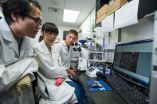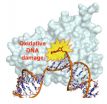(Press-News.org) With research and development costs for many drugs reaching well into the billions, pharmaceutical companies want more than ever to determine whether their drugs already at market have any hidden therapeutic benefits that could warrant putting additional indications on the label and increase production.
Such repurposing of drugs requires evidence of efficacy, and to find candidate drugs for randomized controlled repurposing trials, investigators can use computer simulation and scans of health care billing data, in addition to in vitro and in vivo testing.
A study led by researchers at Vanderbilt University Medical Center presents a new and efficient method for uncovering drug benefits that may lie hidden, and for drawing more informative repurposing predictions.
It looks to be the first study using automated analysis of electronic health records (EHRs) to validate a so-called drug repurposing signal.
More specifically, the study lends new plausibility to the hypothesis that metformin, a diabetes drug that patients generally find easy to tolerate, might have use in treating at least some types of cancer.
The study appears in the Journal of the American Medical Informatics Association. Josh Denny, M.D., M.S., associate professor of Biomedical Informatics and Medicine, and Hua Xu, Ph.D., M.Phil., M.S., adjunct associate professor of Biomedical Informatics, are joined in the study by colleagues at Vanderbilt, Columbia University and Mayo Clinic.
Scanning records of some 32,000 cancer patients seen at Vanderbilt since the mid-1990s, the team trained their sights on five-year survival with and without exposure to metformin -- a drug that's been in use as a first-line therapy for type 2 diabetes for more than five decades. (Patients with contraindications to metformin use were eliminated from the cohort.)
The team found that use of metformin as a therapy for type 2 diabetes was associated with: a 23 percent decrease in (all-cause) mortality compared with metformin-free, non-diabetic patients; a 22 percent decrease in mortality compared to other oral hypoglycemic medications; and a 39 percent decrease in mortality compared to diabetic patients receiving insulin but not metformin.
The results are adjusted for age, tobacco use, body mass index and other variables known to influence cancer survival.
For good measure, the team replicated these findings in a second cohort comprised of some 79,000 cancer patients seen at Mayo Clinic.
Site-specific cancers showing decreased mortality with metformin (in at least one of the two EHR cohorts) included breast, colorectal, lung and prostate.
"Our EHR allowed us to delve into details of treatment and response -- cancer staging, control of cancer, the various timelines involved and cancer subtypes," Denny said.
The team drew on structured data from the clinical lab as well as natural language processing, which uses linguistic rules and statistics to extract concepts from written English.
"We're now building on this study, pursuing opportunities for using our EHR to look at all drug exposures across a given disease -- starting with cancer. We're trying to find other signals that may look like metformin in terms of affecting patient outcomes," Denny said.
As EHR networks eventually take shape, the goal would be to adapt this strategy to yet larger, more geographically dispersed cohorts.
Elsewhere, meanwhile, a randomized controlled clinical trial is under way to examine metformin's efficacy in regard to cancer treatment.
INFORMATION:
The research was supported by the National Institutes of Health (grants CA141307, CA172294, CA090949, HL097334, RR024975) and the Cancer Prevention and Research Institute of Texas.
Parasites use Trojan horse subterfuge to suppress the immunity of their victims when causing infection, according to a study.
The finding, which shows a new trick parasites can play, paves the way to possible treatments for infectious diseases and allergies.
Scientists have shown that parasites are able to secrete tiny sealed packages of genetic material into the cells of their victims, in order to suppress the immune response to infection.
The packages, known as vesicles, mimic those that are produced naturally in most organisms to carry out everyday functions such ...
(Boston)-- In the largest study of the genetics of memory ever undertaken, an international researcher team including scientists from Boston University School of Medicine (BUSM), have discovered two common genetic variants that are believed to be associated with memory performance. The findings, which appear in the journal Biological Psychiatry, are a significant step towards better understanding how memory loss is inherited.
Longer life spans and the increased prevalence of memory impairment and dementia world-wide underscore the critical public health importance of ...
BUFFALO, N.Y. - A new hybrid vehicle is under development.
Its performance isn't measured by the distance it travels, but rather the delivery of its cargo: vaccines that contain genetically engineered DNA to fight HIV, cancer, influenza and other maladies.
Described recently in the Proceedings of the National Academy of Sciences, the technology is a biomedical advancement that could help unleash the potential of DNA vaccines, which despite two decades of research, have yet to make a significant impact in the treatment of major illnesses.
"The technology that we're developing ...
There has been much recent debate on the benefits and risks of screening for breast cancer using BRCA1 and BRCA2 mutations in the general adult population. With an estimated 235,000 new breast cancer diagnoses each year in the U.S. and more than 40,000 deaths, it is clearly important to be able to determine which women may be genetically predisposed to breast cancer.
Glenn E. Palomaki, PhD, associate director of the Division of Medical Screening and Special Testing in the Department of Pathology and Laboratory Medicine at Women & Infants Hospital of Rhode Island has ...
This news release is available in German.
Wireless data transmission largely takes place via WLAN networks, such as WiFi. However, these networks are currently limited to high frequency ranges at 2 GHz and above and, hence, have a limited range. The authors of the study, Arnd Weber of the Institute for Technology Assessment and Systems Analysis (ITAS) of KIT and Jens Elsner, a former member of the staff of the KIT Communications Engineering Lab, propose to extend the frequencies for free communication to include lower ranges and even increased transmission power. ...
A higher surge of testosterone in competition, the so-called "winner effect," is not actually related to winning, suggests a new study of intercollegiate cross country runners.
The International Journal of Exercise Science published the research, led by David Edwards, a professor of psychology at Emory University, and his graduate student Kathleen Casto.
"Many people in the scientific literature and in popular culture link testosterone increases to winning," Casto says. "In this study, however, we found an increase in testosterone during a race regardless of the athletes' ...
Anglers across the nation wondering why luck at their favorite fishing spot seems to have dried up may have a surprising culprit: a mine miles away, even in a different state.
Scientists at Michigan State University (MSU) have taken a first broad look at the impacts of mines across the country- and found that mining can damage fish habitats miles downstream, and even in streams not directly connected to the mines.
The work is published in this week's issue of the journal Ecological Indicators.
"We've been surprised that even a single mine in headwaters might influence ...
Australian average incomes are falling with the country's population growth "masking underlying economic weakness", according to a QUT economist.
Dr Mark McGovern, a senior lecturer in QUT's Business School, said while it was regularly proclaimed Australia had experienced positive economic growth for more than 20 years, there had been periodic per capita declines, indicating the economy was not as healthy as assumed.
"Looking at national income figures in recent years shows our economy is under stress," Dr McGovern, whose research was recently published in the Economic ...
Few agribusinesses or governments regulate the types of plants that farmers use in their pastures to feed their livestock, according to an international team of researchers that includes one plant scientist from Virginia Tech.
The problem is most of these so-called pasture plants are invasive weeds.
In a Proceedings of the National Academy of Sciences study this month, the scientists recommended tighter regulations, including a fee for damage to surrounding areas, evaluation of weed risk to the environment, a list of prohibited species based on this risk, and closer ...
Using a new imaging technique, National Institutes of Health researchers have found that the biological machinery that builds DNA can insert molecules into the DNA strand that are damaged as a result of environmental exposures. These damaged molecules trigger cell death that produces some human diseases, according to the researchers. The work, appearing online Nov. 17 in the journal Nature, provides a possible explanation for how one type of DNA damage may lead to cancer, diabetes, hypertension, cardiovascular and lung disease, and Alzheimer's disease.
Time-lapse crystallography ...





